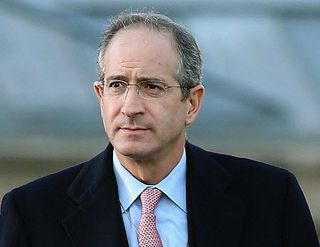Roberts Congratulates Charter-TWC on Deal

Not to be a spoilsport, Comcast chairman and CEO Brian Roberts congratulated Charter Communications, Time Warner Cable and Bright House Networks on their landmark deal Tuesday, adding that the transaction “makes all the sense in the world.”
Comcast had agreed to pay about $67 billion for TWC in February 2014, but that agreement was terminated after it became apparent that federal regulators would not approve the deal. The Charter transaction, which values TWC at $78.7 billion including debt, is expected to have an easier go of it on the regulatory front.
"This deal makes all the sense in the world,” Roberts said in a statement. “I would like to congratulate all the parties."
Whether regulators feel the same way remains to be seen, but according to reports, Federal Communications Commission chairman Tom Wheeler had reached out to cable CEOs to tell them that the agency was not against all consolidation in the industry.
In an interview with CNBC this morning, Charter CEO Tom Rutledge – who will become chairman and CEO of the combined entity – wouldn’t comment on any personal conversations with Wheeler, but said the chairman’s public comments have been consistent with what the agency has said in the past as to its vision for the changing broadband landscape.
“I don't want to talk about any conversations i had with the chairman, but if you look at the public statements of the FCC, what the FCC is seeking I think is being developed by this transaction,” Rutledge told CNBC. it's not just about doing no harm; it's about bringing better services to the country and to customers and expanding the footprint upon which those services are delivered and I think that the competitive environment is enhanced by us doing this. If you look at the ecosystem, who we are playing with in terms of other competitors, they are very large. We'll still be a relatively small company compared to the large phone companies, compared to Comcast, compared to the wireless companies. I think this is good for us. It's good for the country. i think it's consistent with what the regulators have said publically that they are looking for in these kinds of transactions.”
Not everyone was quite as enamored with the deal. In a statement, Free Press research director S. Derek Turner said the FCC should aplly lessons learned from the terminated Comcast-TWC transaction in evaluating the smaller Charter-TWC deal.
Multichannel Newsletter
The smarter way to stay on top of the multichannel video marketplace. Sign up below.
"The cable platform is quickly becoming America's local monopoly broadband infrastructure,” Turner said in a statement. “Charter will have a tough time making a credible argument that consolidating local monopoly power on a nationwide basis will benefit consumers. Indeed, the issue of the cable industry's power to harm online video competition, which is what ultimately sank Comcast’s consolidation plans, are very much at play in this deal.
"Ultimately, this merger is yet another example of the poor incentives Wall Street's quarterly-result mentality creates,” he continued. “Charter would rather take on an enormous amount of debt to pay a premium for Time Warner Cable than build fiber infrastructure, improve service for its existing customers or bring competition into new communities. We will carefully examine Charter's case, in particular its arguments for why this transaction is supposedly better for competition in the broadband and pay-TV markets than new investment. Charter needs to explain why this consolidation will improve competition, and a simple argument of scale won't work here. Charter's network is already superior to TWC's and that of other large cable companies, which proves that you don’t need to become a colossus to succeed in this business."
